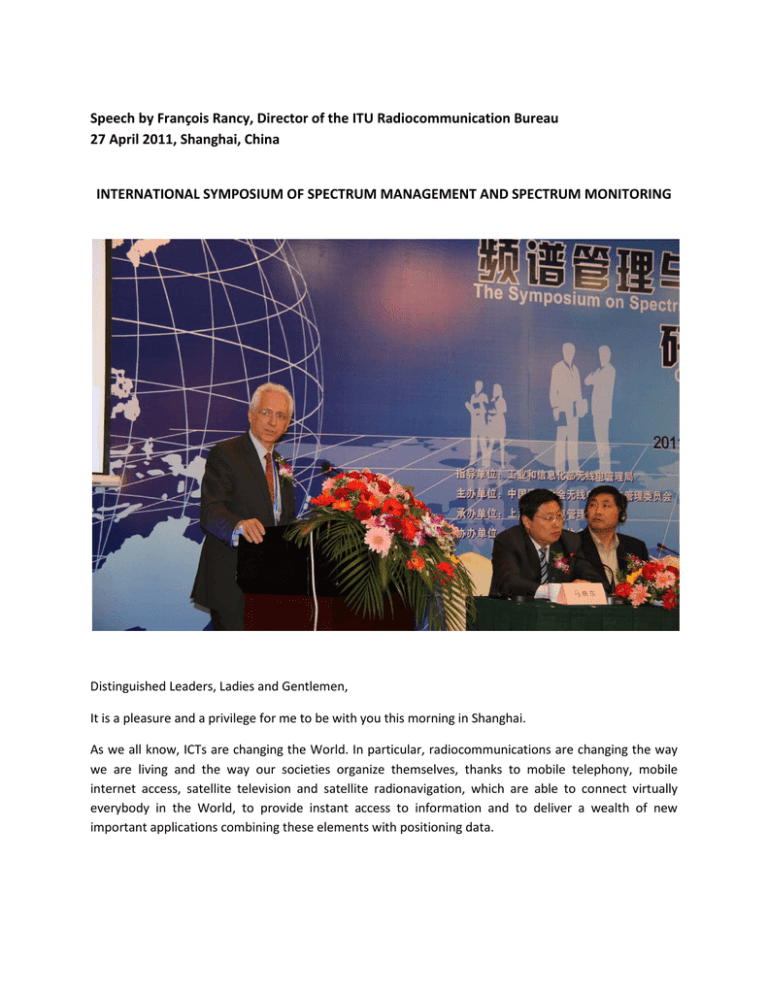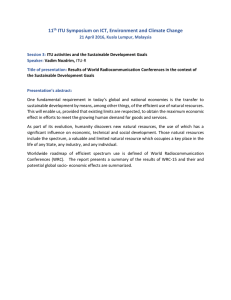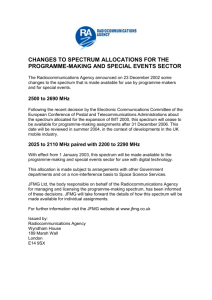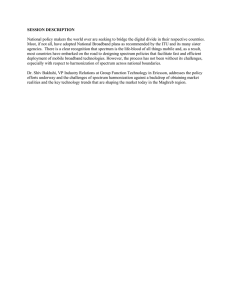Speech by François Rancy, Director of the ITU Radiocommunication Bureau
advertisement

Speech by François Rancy, Director of the ITU Radiocommunication Bureau 27 April 2011, Shanghai, China INTERNATIONAL SYMPOSIUM OF SPECTRUM MANAGEMENT AND SPECTRUM MONITORING Distinguished Leaders, Ladies and Gentlemen, It is a pleasure and a privilege for me to be with you this morning in Shanghai. As we all know, ICTs are changing the World. In particular, radiocommunications are changing the way we are living and the way our societies organize themselves, thanks to mobile telephony, mobile internet access, satellite television and satellite radionavigation, which are able to connect virtually everybody in the World, to provide instant access to information and to deliver a wealth of new important applications combining these elements with positioning data. Radiocommunications are using a common resource: spectrum. Good spectrum management is therefore a prerequisite for the development of radiocommunications. It is based on three pillars, which are equally essential. The first pillar is sound spectrum allocations. This requires extensive international cooperation, so that regional, or preferably worldwide, spectrum harmonization, takes place and can bring the benefits of economies of scale and international roaming, in a way that encourages new technologies without threatening past investments in radiocommunications networks. This is the role of the ITU and, in this region, of the APT. I have witnessed, over the last 15 years, the increasing activity deployed by China and Asian countries in this domain, in parallel with that of your radiocommunication industry. The second pillar of spectrum management is to ensure that the rights of spectrum users are recorded in national and international registries, in order to gain national and international recognition. This is the purpose of licensing, coordination and recording of frequency assignments. This requires extensive efforts at national level and cooperation at international level to maintain data bases by applying the relevant procedures at all levels. The ITU role in this respect is to ensure that all the rights of spectrum users at international level are established and maintained in conformity with the Radio Regulations and associated provisions. The third pillar of spectrum management is spectrum monitoring. Its purpose is to ensure that the actual usage of spectrum corresponds to the frequency assignments which have been authorized, coordinated and recorded. With the rapid development of radiocommunication services, this also requires extensive efforts at national and international levels and increased cooperation between countries, in three areas: - market surveillance, to ensure that the radio terminals which are now available on the mass market at very low price do not threaten authorized uses. systematic surveillance of actual usage and, when in spite of all efforts, interference occurs, investigation and resolution of interference cases, which involves a significant amount of international cooperation. Ladies and Gentlemen, as result of the rapid evolution of radiocommunications towards mass market applications which require and expect full coverage of the population, spectrum monitoring is now facing new challenges, in particular in large cities like Shanghai where propagation is affected by a large number of tall buildings. For this, it is necessary to increase investments in monitoring networks at national level and, because interference knows no boundaries, to increase cooperation at international level. But firstly, this requires careful thinking and innovative approaches. Ladies and Gentlemen, what you are going to discuss and achieve this week is therefore very important. This is why I am glad to salute the efforts of China to address and identify new approaches to spectrum management and monitoring issues. I wish you the best success for this international symposium on spectrum and spectrum monitoring.





